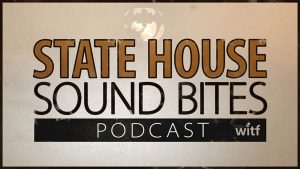With the legislature out of session for (probably) the entire summer, it’s time to turn our attention to some other reporting projects outside the daily grind of Harrisburg.
Paula Knudsen of The Caucus and Sam Janesch of L&P and The Caucus have spent the last couple weeks reporting on a ubiquitous, little-discussed feature of Capitol life: food—tables and tables of it!—that routinely sits outside committee meetings and political events, and which is paid for with tax dollars.
Paula and Sam explain how much money is in lawmakers’ budgets for all that food, why it doesn’t count in their state-supplied per diems, and more.
Plus, PennLive’s Wallace McKelvey joins us to talk about water quality, a topic he’s been reporting on for many months. Specifically, he’ll explain why the DEP’s water inspectors have become so short-staffed over the last decade, how water systems across the state have been falling into disrepair, and what that could all mean for the average Pennsylvania water-drinker.
Also: this is the final podcast of the summer before a short hiatus. We’ll be back and better than ever when the legislature returns to session in the fall!
Podcast: Play in new window | Download
Subscribe: RSS



